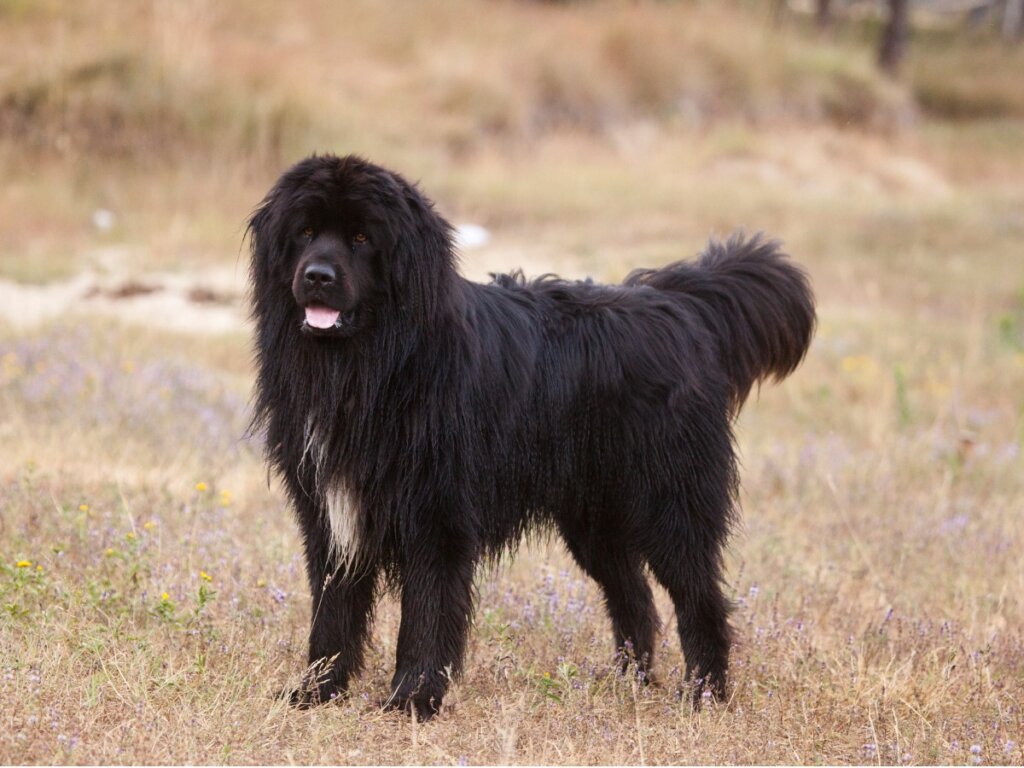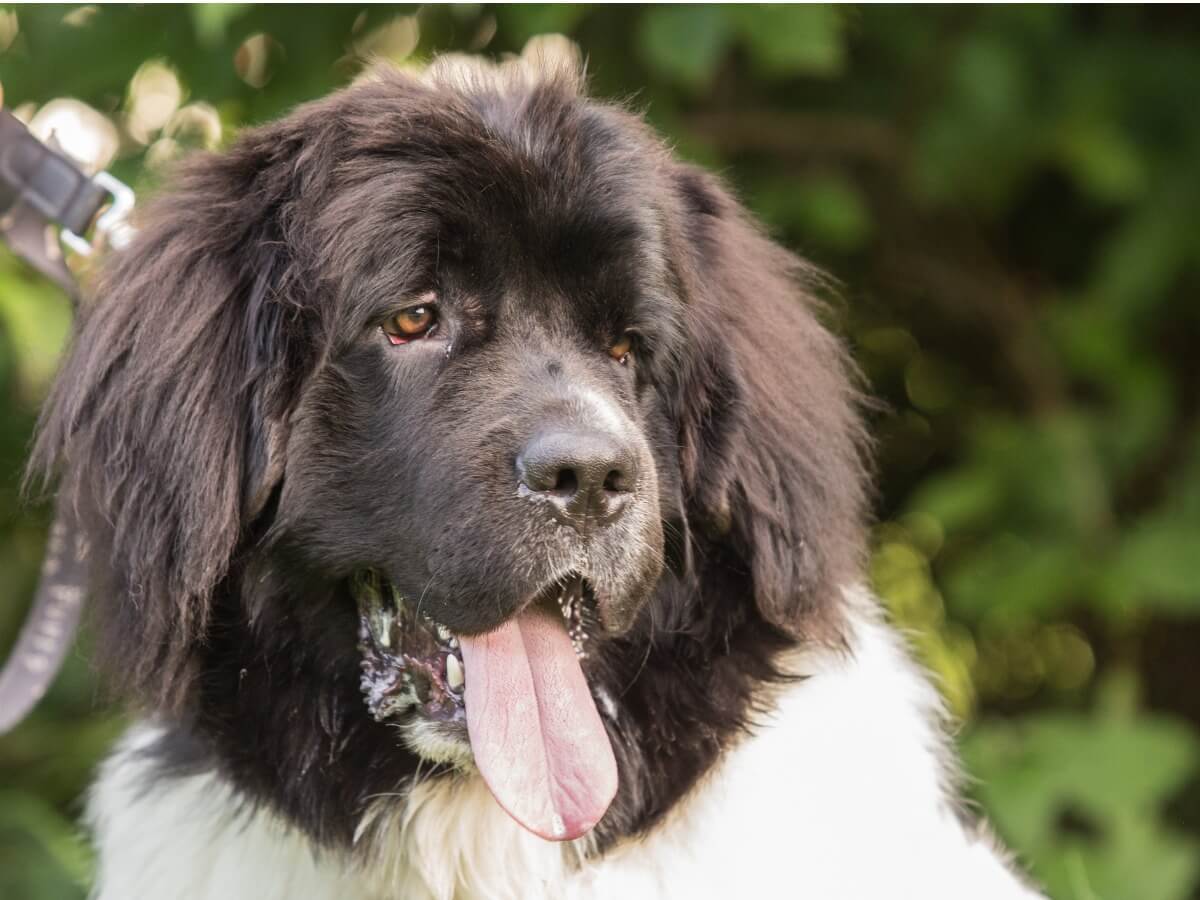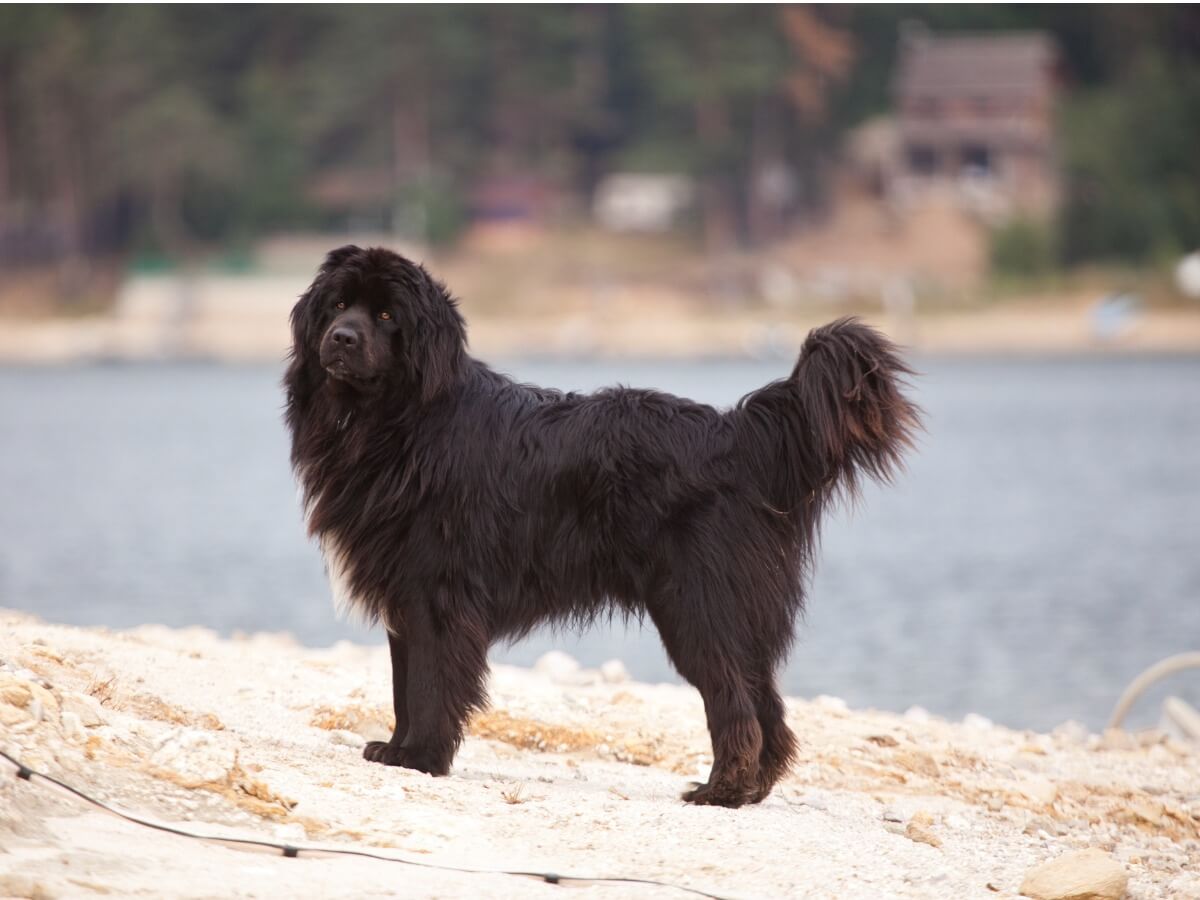Newfoundland Dog Feeding

The Newfoundland dog is a giant breed dog that requires a quality diet in order to meet all its needs. It’s a beautiful, imposing, and healthy dog, but these aspects depend directly on its diet, which must be complete and balanced. If not, its physical, cognitive, and emotional health and abilities may be affected.
In this article, we’re going to tell you a little more about the characteristics of the Newfoundland dog and the fundamental aspects of a correct diet for it. If you’re planning to adopt this breed of dog, then read on to learn more about it.
Characteristics of the Newfoundland dog
According to the Federation Cynologique Internationale (FCI), the Newfoundland is a breed native to the island of Newfoundland (Canada) descended from the great black bear dog, introduced to the region by the Vikings in the year 1100. It’s an imposing dog, solid and large, and characterized by being noble and sweet, as well as cheerful and serene.
One of the most attractive features of the Newfoundland is its coat, which is double-layered and waterproof. The outer section is long and smooth, while the inner section is soft and dense. In the area of the head, the muzzle, and the ears it has short, fine hair and on the extremities it has fringes. Its tail is covered with hair, which gives it a flag-like appearance.
Dark is its traditional color, but it’s possible to find varieties in black and white, as well as chestnut. Their average weight is 68 kilograms (150 pounds) for males and 54 kilograms (120 pounds) for females. In terms of height, adult males reach 71 centimeters (2.3 feet) and females 66 centimeters (2.1 feet). They have a life expectancy that varies between 9 and 10 years.

How much a Newfoundland eats
According to professional articles, Newfoundland dogs have a clear predisposition to obesity. In addition, they tend to be gluttonous and eat very fast, which can lead to long-term digestive problems (such as gas and gastric torsion).
For this reason, owners should carefully measure the amounts of food to be fed, to minimize the chances of the Newfoundland dog becoming overweight. Also, to avoid problems with eating quickly, the use of an anti-reflux and anti-anxiety feeder can be considered.
Once the weaning time is over, the Newfoundland puppy should start eating a high-quality feed to ensure optimal growth and mental development. The best thing will be to establish a feeding plan with the veterinarian, after reviewing and weighing the dog, but we’d like to share some guidelines:
- From 2 to 3 months: 4 daily servings of a specialized feed for puppies should be provided.
- 4 to 5 months: 3 servings are provided per day.
- From 6 to 12 months: 2 to 3 servings are given per day.
- From 12 months: 2 to 3 servings of an adult feed are served each day.
The amount of food a Newfoundland dog should eat depends on its specific weight. For example, a 40-kilogram (88 pounds) adult should consume between 600 and 800 grams of food each day (21 to 28 oz) which should be divided into two servings.
Newfoundland dog feeding
Research indicates that large breed dogs, including the Newfoundland, tend to develop bone problems if they aren’t fed properly, especially during their growth stage, that is, when they’re puppies.
Next, we will tell you what the nutritional needs of the Newfoundland dog are during the most important stages of its life. Do not miss it.
Newfoundland puppy feeding
The Newfoundland is considered a puppy (and should eat specialized feed for this age) up to 12 months. This is the most important stage, since its health, growth and development will depend on its diet in these months. Research shows that, at this age, canids need food that provides them with a lot of energy to ensure optimal progress.
Ít also explains that it’s important to take care of the puppy’s weight, because obesity during growth is directly related to the appearance of hip dysplasia, osteochondrosis, and hypertrophic osteodystrophy. All these conditions drastically reduce the dog’s quality of life.
The Newfoundland puppy will also require the presence of lipids, essential fatty acids, and fat-soluble vitamins in its diet. Proteins are just as important, as they provide you with essential amino acids, vital for the proper development of their muscles. Prebiotics and probiotics are critical to your gastrointestinal health.
Adult feeding
Once the Newfoundland dog reaches its first year of life, it’s considered an adult. From this moment on, you’ll need to change its diet, because nutritional needs vary. Take into account that its metabolism slows down. To make the right choice of feed, discuss it with the veterinarian, who’ll make a new diet plan according to its exact weight and health conditions.
At this age, the percentage of protein should be at least 25%, while carbohydrates should be moderate to avoid becoming overweight. Fats such as omega 3 and 6 are essential in order to maintain their cardiovascular system and cognitive capacity in a healthy condition.
To prevent problems such as hip and elbow dysplasia and strengthen their joints, it’s best to consult your vet about the possibility of providing supplements and vitamins to support their diet. These types of supplements should always be prescribed by a professional and it isn’t a good idea to independently medicate pets.
Feeding the elderly Newfoundland
Professional articles indicate that, in very large or giant dog breeds, they are classed as “elderly” between 5 and 6 years old. From this moment on, it’s necessary to make some adjustments in the diet if certain diseases occur, such as the following:
- Mellitus diabetes
- Prostatic, cardiovascular and degenerative diseases
- Obesity
- Hypothyroidism
- Anemia
- Neoplasms
- Urinary insufficiency
If the dog reaches this age without any health problems, then the diet that has been provided can be maintained, as it’s considered to be a complete and balanced diet. The percentage of animal protein that’s provided must also be preserved and you mustn’t exceed the portion, in order to prevent excess weight and obesity.
As they become older, it’s necessary to accommodate the dog’s physical condition, and not force them to do exercise. You also need to understand that, just like humans of this age, they may develop ailments and mood swings. In this, and in all phases, hydration as part of the diet is very important. You should always have a full container to quench the animal’s thirst.
The BARF diet and the Newfoundland dog
The BARF diet or Biologically Appropriate Raw Food proposes the consumption of raw bones and proteins of animal origin, mixed with portions of vegetables and fruits and different types of oils and supplements of natural origin.
This is a good feeding option for Newfoundland dogs, but it should also be supervised by a nutrition professional. Only in this way will it be possible to guarantee that the animal gets all the nutrients that its body needs and in the right balance.
The Barf diet stands out because it provides nutrients without preservatives or chemicals, because it strengthens the immune system and contributes to better oral hygiene.
Risks of improper feeding in the Newfoundland dog
Newfoundland dogs, as well as any other breed, can develop health problems associated with an inadequate diet. The most common disorder in the Newfoundland is stomach torsion, in which this organ twists and fills with gas, preventing blood flow.
To avoid this problem, in addition to providing adequate nutrition, it’s necessary to prevent the dog from eating too fast and in large amounts, and so you’ll need to spread their food out over the day in separate servings. Another problem associated with poor diet is obesity, which is considered serious in this breed due to its effects on the bone and joint structure.

In this article, we’ve given you general recommendations on the feeding of the Newfoundland dog, but remember that it’s always necessary to consider the opinion of a professional. If you get your dog’s diet right, then you’ll be able to enjoy it for many years.
All cited sources were thoroughly reviewed by our team to ensure their quality, reliability, currency, and validity. The bibliography of this article was considered reliable and of academic or scientific accuracy.
- Estándar FCI Nº50 – Terranova (Newfoundland). http://www.fci.be/nomenclature/standards/050g02-es.pdf
- Diez, M., Nguyen, P. Obesidad: epidemiología, fisiopatología y cuidados del perro obeso. Enciclopedia de la Nutrición Clínica Canina.
- Gaviria, J. Alimentación general y especializada para mascotas en una empresa productora de alimentos balanceados para animales. Corporación Universitaria Lasallista. 2016.
- Jeusette, I., Romano, Victor. Nutrición del cachorro. Research reports.
- Jaume Camps Rabadá. Alimentación y cuidados especiales en perros geriátricos. Animalia.
- Sillero, M. Mitos y dietas alternativas en perros y gatos, revisión sobre sus efectos y recomendaciones. Universidad Católica de Valencia. 2019.
